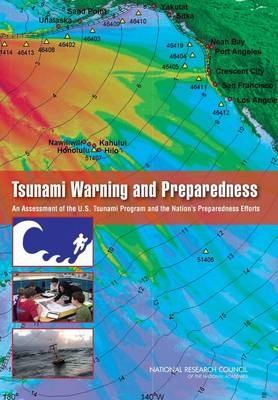
Tsunami Warning and Preparedness
National Academies Press (Verlag)
978-0-309-13753-9 (ISBN)
It asserts that seamless coordination between the two Tsunami Warning Centers and clear communications to local officials and the public could create a timely and effective response to coastal communities facing a pending tsuanami. According to Tsunami Warning and Preparedness, minimizing future losses to the nation from tsunamis requires persistent progress across the broad spectrum of efforts including: risk assessment, public education, government coordination, detection and forecasting, and warning-center operations. The book also suggests designing effective interagency exercises, using professional emergency-management standards to prepare communities, and prioritizing funding based on tsunami risk.
1 Front Matter; 2 Executive Summary; 3 Summary; 4 1 Introduction; 5 2 Aligning Priorities with Societal Risks from Tsunamis; 6 3 Education and Preparedness of Individuals, Communities, and Decision Makers; 7 4 Tsunami Detection and Forecasting; 8 5 Long-Term Reliability and Sustainability of Warning Center Operations; 9 References; 10 Appendix A: Examples of Tsunami Sources That Threaten the United States; 11 Appendix B: Review of the Tsunami Warning and Forecast System and Overview of the Nation's Tsunami Preparedness; 12 Appendix C: Relative Hazards of Near- and Far-field Tsunami Sources; 13 Appendix D: Available Tsunami Evacuation Maps; 14 Appendix E: Examples of Tsunami Education Efforts; 15 Appendix F: June 14, 2005: A Case Study in Tsunami Warning and Response; 16 Appendix G: Magnitudes from C. Richter to Mwp and the W phase; 17 Appendix H: Tsunami Earthquakes; 18 Appendix I: Samoa Tsunami; 19 Appendix J: Response to the Chilean-Earthquake Generated Tsunami: The Hawaii Case Study; 20 Appendix K: Acronyms; 21 Appendix L: Committee and Staff Biographies
| Erscheint lt. Verlag | 1.3.2011 |
|---|---|
| Verlagsort | Washington |
| Sprache | englisch |
| Maße | 178 x 254 mm |
| Themenwelt | Naturwissenschaften ► Biologie ► Ökologie / Naturschutz |
| Naturwissenschaften ► Geowissenschaften ► Meteorologie / Klimatologie | |
| Sozialwissenschaften ► Pädagogik ► Sozialpädagogik | |
| Sozialwissenschaften ► Soziologie | |
| ISBN-10 | 0-309-13753-5 / 0309137535 |
| ISBN-13 | 978-0-309-13753-9 / 9780309137539 |
| Zustand | Neuware |
| Informationen gemäß Produktsicherheitsverordnung (GPSR) | |
| Haben Sie eine Frage zum Produkt? |
aus dem Bereich


